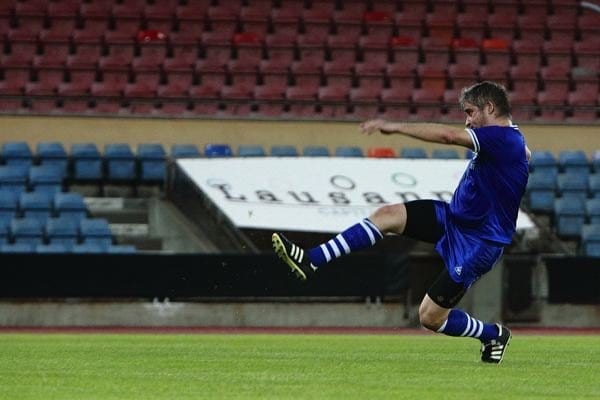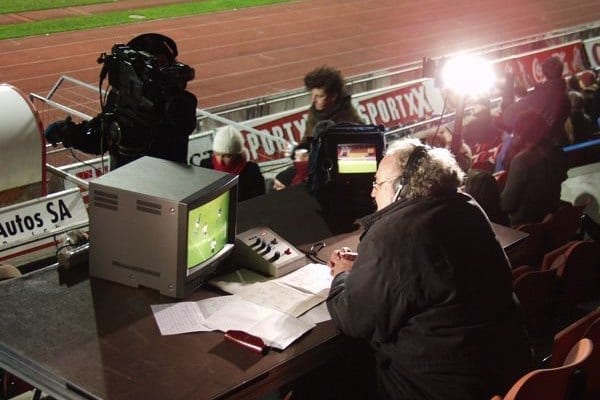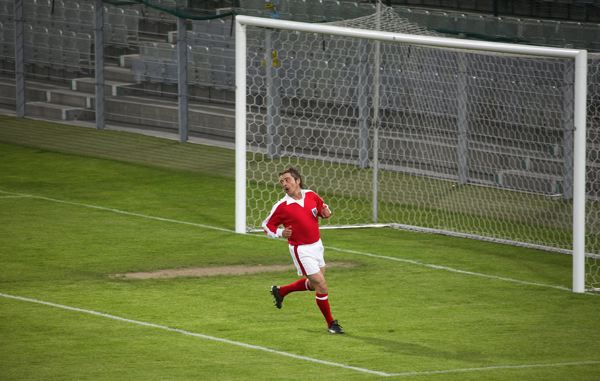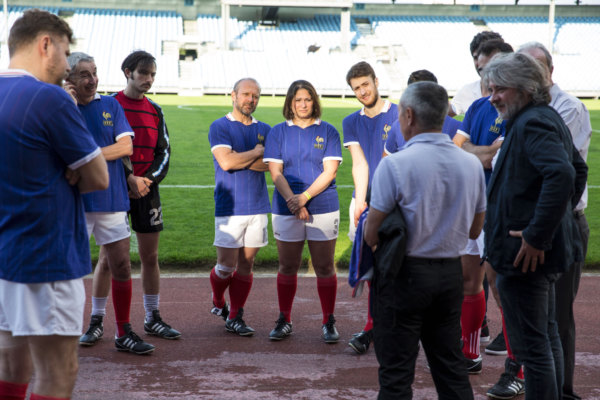Date(s)
- 3 juillet 2015 – Festival de la Cité – Lausanne (CH)
Vidéos
https://player.vimeo.com/video/127510468Prolongation – Perfo Foot (2015)
The Performance of Football: Alone and Without the Ball
Origin of the Project
The idea of the performance arose from a personal memory, an intimate recollection. As a child, Massimo Furlan used to play in his room for hours with a foam ball while listening to the running commentaries of the football games of the Italian championship on the radio. He would mime all the players’ actions and, when the commentary was interrupted because of the poor quality of the transmission, he would resume the thread and include his own name. Thus, he became a world champion, again and again, scoring countless goals.
The First Time
The project soon went from being personal (arising from a personal memory) to collective, as soon as it was shared with a production team. On December 7th 2002, the football rolled out of the room and onto a real field – the Pontaise stadium in Lausanne – and the player threw on his jersey for a first live performance, within the framework of the Festival Les Urbaines. Massimo Furlan wore the colours of Italy – and the number 23. The scenario of the performance was the 1982 World Cup final between Italy and Germany, which Italy ended up winning. The idea was to re-enact, alone and without a ball, the whole match, with all its drama. Jean-Jacques Tillman, the former commentator of the Swiss national TV channel, provided a live commentary, while the audience re-lived the match, themselves assuming the role of supporters.
A New Game Every Time
A football-related performance inevitably relates to the memory of a place, a community, and a country. It is based on a game that people remember – a game that contributed to the building of an identity and that was etched into the collective mind. Several cities (Paris, Marseille, Vienna, Hamburg, Warsaw, Porto, Seoul…) invited Massimo Furlan to perform within the framework of a performing arts’ festival most of the time. Every time, he identified the most significant game for each specific country or region. He then chose the player he would embody – a decisive player for that particular game, like Platini, Boniek, Sparwasser, or Madjer… The performance always takes place in a stadium.
The Preparation Work
To prepare himself, Massimo Furlan memorises the whole match, tirelessly watching the game and detecting all the players’ movements. He writes down all the players’ actions, tries to grasp the partition, so as to re-enact it later, like some sort of choreography. He then records his own commentary, which describes the players’ actions, and which will then be played back in an earpiece during the performance, to remind him of the many actions. He then needs to prepare himself physically to keep going for a whole game, running, sprinting, stopping, and falling. When the performance takes place, a TV or radio sports’ commentator – a football specialist – gives a running commentary of the game in the stadium. He stands in the terraces, becoming a performer himself, reviving this event from the past.
1 Player, 21 Ghosts
The game is played in its entirety, with all its twists and turns. Time doesn’t exist anymore – this is a re-enactment, a repetition, like some sort of “recurrence”: the player runs across the field under the gaze of the spectators, alone and without a ball, surrounded by 21 ghosts. The audience watches on and re-lives the game, listening to the story that (s)he is hearing again, via a small radio that broadcasts the live commentary and enables him/her to follow the action. The spectator knows how events will unfold, as well as the final result. And yet it still seems like sudden developments and surprises could somehow disrupt the story. It hangs on a thread, on the edge, as if at any moment, victory or defeat might come and change the course of history. The spectator is akin to a child who listens to a same story (s)he requested, again and again, checking that it is still the same, that everything is in its right place, for the sake of repetition, but also maybe to discover if, by some marvellous coincidence, an elusive change might have occurred.

 Furlan/Numero23
Furlan/Numero23 Foot
Foot Le Cauchemar de Séville (2018)
Le Cauchemar de Séville (2018)